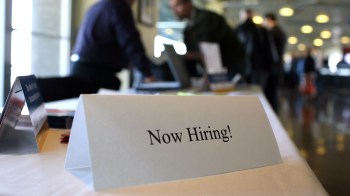TEXT OF INTERVIEW
KAI RYSSDAL: Dubai imports its construction workers. Its bankers, too, to work in the private sector. The locals do government work. Problem is those government jobs aren’t so plentiful anymore. So most Emiratis don’t work at all. Across the broader gulf region, it’s a similar story. Unemployment is near 15 percent. Way worse if you only count people under 30. As the economy of this region keeps growing, and it will, disparities between the native population and those who are just visiting could become a problem. I sat down last week with labor consultant Kito de Boer and I asked him what the leadership in the Gulf ought to do about that.
KITO DE BOER: The first is it has to get its education system right. The current education system is failing by any objective measure. The second thing that they need to do is to get the labor and immigration rules coherent and consistent with giving their citizens priority when it comes to employment. And only bringing in those people who have a distinctive contribution to make to economic development.
RYSSDAL: Characterize the labor market here. The gulf specifically.
DE BOER: The gulf countries are unique. They have a flexible immigration policy where it’s pretty easy to get in, though it’s getting more difficult. But they have very rigid labor markets, which means that once you’re in on a specific job, it is difficult, sometimes impossible, to change jobs. You get locked in.
RYSSDAL: Let me get back to education for a second. What is it about the education system here that is failing the population?
DE BOER: The way that people get taught in the gulf is they get taught by rote. They get reinforced to recite what they were told. A very traditional form of learning. I think many societies go through that stage, but it does not advance critical thinking. Many people would also…many employers would also say that a number of basic skills are underdeveloped, which makes people hard to be employed. But there is not a mechanism that has yet been developed in many of these countries to actually reconcile and come to a national agreement about what it is we actually want schools to teach.
RYSSDAL: Labor policy here has been the way it is so that this place could grow. Education policy has been the way it is because of societal norms. Where will the impetus come from for change in either one of those areas in the next five or ten years?
DE BOER: When you speak to the rulers in the region, the one thing that they will have clear agreement around is that they see the number one priority for their countries moving forward to be education. By 2020 the GDP per head, the amount of wealth per head, per person in this region, will be where Germany and Japan, amongst the wealthiest countries in the world, are today.
The real risk is that if you have an economy with a wealth per head of Germany or Japan, but an educational system where the educational attainments are on the level of Ghana, then you have a major societal problem. Because the majority of their people in their society will not be able to gain effectively through their own labor the benefits of what’s happening to their economy. They have to find a way of getting their own societies to be the primary beneficiaries of that.
RYSSDAL: Kito de Boer is managing for McKinsey here in the Middle East. Mr. de Boer, thank you so much.
There’s a lot happening in the world. Through it all, Marketplace is here for you.
You rely on Marketplace to break down the world’s events and tell you how it affects you in a fact-based, approachable way. We rely on your financial support to keep making that possible.
Your donation today powers the independent journalism that you rely on. For just $5/month, you can help sustain Marketplace so we can keep reporting on the things that matter to you.


















